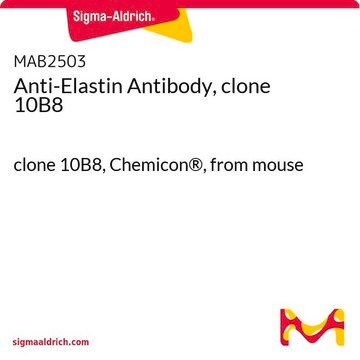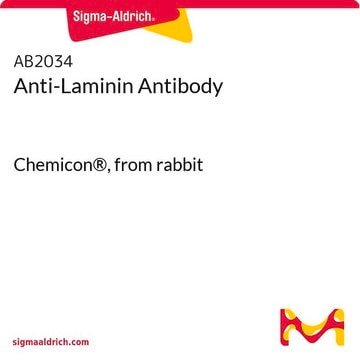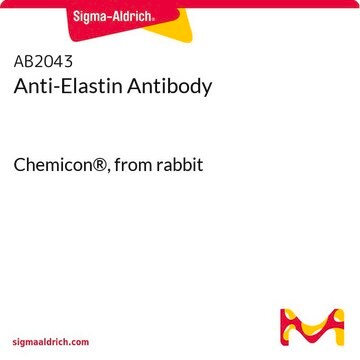推荐产品
生物源
mouse
品質等級
共軛
unconjugated
抗體表格
ascites fluid
抗體產品種類
primary antibodies
無性繁殖
BA-4, monoclonal
分子量
antigen 67.5 kDa
包含
15 mM sodium azide
物種活性
human, goat, sheep, guinea pig, pig, canine, feline, bovine
包裝
antibody small pack of 25 μL
技術
immunohistochemistry (formalin-fixed, paraffin-embedded sections): 1:5,000 using sheep arterial tissue
microarray: suitable
同型
IgG1
UniProt登錄號
運輸包裝
dry ice
儲存溫度
−20°C
目標翻譯後修改
unmodified
基因資訊
human ... ELN(2006)
一般說明
Monoclonal Anti-Elastin (mouse IgG1 isotype) is derived from the hybridoma produced by the fusion of mouse myeloma cells and splenocytes from an immunized mouse. Elastin is an important polymeric protein of connective tissue. It is synthesized and secreted as a soluble single-chain protein (tropoelastin) that undergoes numerous post-ribosomal modifications prior to the organization of the elastic fiber in the extracellular space.
特異性
The antibody binds to insoluble elastin, α-elastin, tropoelastin (the soluble non-cross linked precursor of elastin) and to peptide fragments generated by proteolytic digestion of insoluble elastin. In tropoelastin preparations, three immunoreactive bands have been observed at 67.5 kDa, 65 kDa and 62 kDa corresponding to the three elastin isoforms. The antibody is specific for an epitope composed of the repeated sequence in elastin: Val-Gly-Val-Ala-Pro-Gly. This epitope has been shown to be a chemoattractant for fibroblasts and monocytes.
免疫原
bovine α-elastin.
應用
Monoclonal Anti-Elastin antibody produced in mouse has been used in:
- immunohistochemistry
- immunostaining
- immunoblotting
生化/生理作用
Elastin is encoded by the ELN gene in humans. It is a polymeric protein in connective tissue that has exceptional properties of extension, elastic recoil to the extracellular matrix and allows many tissues in the body to resume their shape after stretching or contracting. Elastin is a self-assembling, extracellular-matrix protein providing tissue elasticity and is predominantly comprised of cross-linked tropoelastin. It plays an important role in the atherosclerotic process. The conformational disorder is caused due to a constitutive feature of elastin structure and function.
Elastin undergoes changes of morphology with aging and in many disease states. For example, abnormal accumulation of connective tissue in blood vessels contributes to alterations in vascular physiology associated with diseases such as hypertension and atherosclerosis. Several heritable diseases such as Marfan syndrome, pseudoxanthoma elasticum and the Buschke-Ollendorf syndrome may result from molecular defects of elastin.
免責聲明
Unless otherwise stated in our catalog or other company documentation accompanying the product(s), our products are intended for research use only and are not to be used for any other purpose, which includes but is not limited to, unauthorized commercial uses, in vitro diagnostic uses, ex vivo or in vivo therapeutic uses or any type of consumption or application to humans or animals.
未找到合适的产品?
试试我们的产品选型工具.
儲存類別代碼
10 - Combustible liquids
水污染物質分類(WGK)
WGK 3
閃點(°F)
Not applicable
閃點(°C)
Not applicable
其他客户在看
Sean E Reichheld et al.
The Journal of biological chemistry, 289(14), 10057-10068 (2014-02-20)
Elastin is the intrinsically disordered polymeric protein imparting the exceptional properties of extension and elastic recoil to the extracellular matrix of most vertebrates. The monomeric precursor of elastin, tropoelastin, as well as polypeptides containing smaller subsets of the tropoelastin sequence
Chae-Eun Yang et al.
International journal of molecular sciences, 21(6) (2020-03-28)
An adenoviral vector (Ad) expressing a Wnt decoy receptor (sLRP6E1E2) is known to induce an anti-fibrotic effect by inhibiting Wnt signaling. We evaluated its effects in vivo using pig models and attempted to introduce an alginate gel-matrix system to prolong
Exercise training enhances elastin, fibrillin and nitric oxide in the aorta wall of spontaneously hypertensive rats
de Andrade AMTJ, et al.
Experimental and Molecular Pathology, 89(3), 351-357 (2010)
Fabricated elastin
Yeo GC, et al.
Advanced Helathcare Materials, 4(16), 2530-2530 (2015)
Moetaz El-Domyati et al.
Journal of cosmetic dermatology, 14(2), 140-144 (2015-04-29)
Botulinum toxin (BTX)-A has been used for years in the reduction of facial wrinkles; however, histological and immunohistochemical changes after its use were not previously investigated. To evaluate histological and immunohistochemical changes after BTX-A injection for facial wrinkles, sixteen volunteers
我们的科学家团队拥有各种研究领域经验,包括生命科学、材料科学、化学合成、色谱、分析及许多其他领域.
联系技术服务部门









